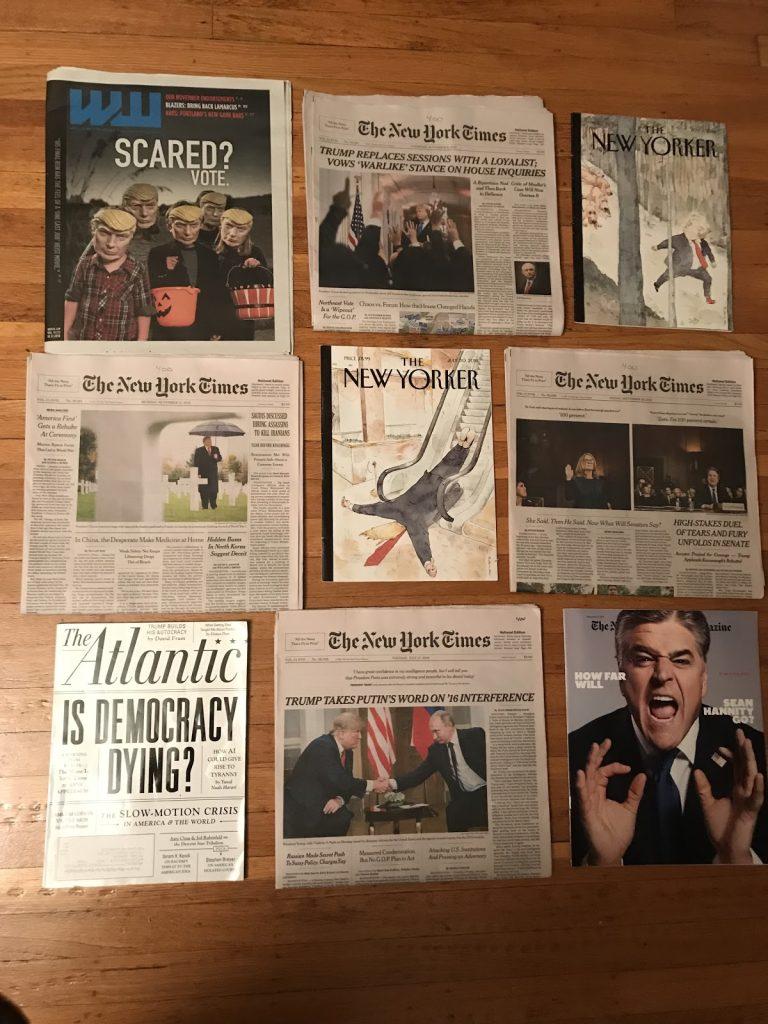
Recently, I was sitting in front of my television finishing up an episode of Columbo when the most horrifying advertisement I’ve ever seen shocked me out of my crime solving daze. The commercial promoted a scarring product called “the Trumpy Bear,” a normal teddy bear with a few major differences, namely an overblown blonde hairstyle and an extra long red tie à la our current president. But wait, there’s more. In what almost seems like a metaphor, the bear features an American flag up its backside, and stared from the TV with notably soulless eyes. I was then informed that all this could be mine with only two simple payments of $19.95! You can imagine the absolutely unmatched joy I felt.
When the commercial ended, I immediately turned to the internet for answers. This couldn’t be real, could it? It is. The Trumpy Bear is a real thing. At first, I couldn’t stop laughing. I just couldn’t fathom that anyone in the world would buy this, especially for such a high price. Later, though, I found that it was still in my mind, and I couldn’t figure out why. It wasn’t until the next morning that it hit me why I found it so bothersome. The existence of this advertisement belies a continuing problem that we’ve faced since the presidential election of 2016: kids are consistently being forced to become politically aware from a young age.
Before Donald Trump hit the stage, kids were generally unaware of politics. I remember that when Obama was first elected, I was happy, but I didn’t know anything about him because I was in kindergarten and the biggest thing on my mind was how hard it was to color in the lines. I just thought that the good guy won, and that was that. In 2012, I defaced every picture of Mitt Romney I found in the newspaper and made fun of his name to everyone in my immediate family. This time, at nine, I was more politically aware, but I still knew nothing about anyone’s policy. In 2016, however, everything changed. Suddenly, I was watching the news every night, wishing I could vote, and wearing campaign buttons. And I was definitely not the only one.
While most of my friends became far more politically active, I also noticed kids much younger than me taking part in politics. This trend continued far past the election and is still happening today. Instead of participating in a walkout, students at my elementary school stood on the playground and formed the shape of a peace sign. Eighth graders at my old middle school organized and participated in their own walkout last year. Both of these events impressed me, but at the same time, I was worried about them, and specifically politics in an elementary school.
Political awareness in children is a good thing, to a certain extent. Kids should know how the government works, who the current president is, and when elections happen. They should know that voting is a right and a responsibility, and that they may encounter people with different political beliefs than those of the people they are normally exposed to. However, exposing children to ideas they’re not equipped to fully process yet can be damaging. For instance, explaining the specifics of the accusations against Brett Kavanaugh by Dr. Christine Blasey-Ford would probably be too much for most primary school kids to handle without stress.
When Trump was elected, Annika Kron was in fourth grade. Even then, she was aware of the issues his presidency posed to minorities. About a year ago, she wrote a letter to Trump, although it was never mailed. The typewritten letter explained the displeasure many Americans felt and continue to feel about his policies, ideals, and actions. Kron called on the president to change the country for the better or face impeachment. She’s in sixth grade now, and on the general issue of childhood involvement in politics, she says, “Kids need time to be kids. They shouldn’t have to focus on politics all the time.”
Kron’s sentiment remains true, in my experience. When I was in elementary school, I spent time playing with my friends outside, making daisy chains and looking for bugs under rocks. I was by no means glued to the news and the political events of the time. Today’s young children have been forced to become politically aware from an increasingly young age due to the staggering abnormality of the Trump administration, and that is unfair to them. As a society, we need to introduce kids to politics in an age-appropriate way that doesn’t create unnecessary worry. Instead of marketing political ideas to children, we should answer their questions when they arise, educate them on their rights, and ensure that they’re not made to process more information than they’re equipped to handle.

































